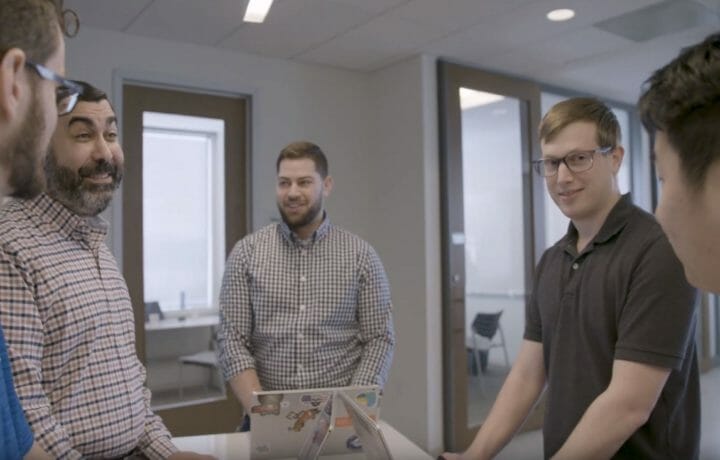In baseball, hitting 500 would be about as average as it gets, but hitting the 500-company milestone for Microsoft Software & Systems Academy (MSSA) is a major achievement. The software giant announced this month that MSSA, which trains transitioning U.S. service members and veterans for careers in the technology industry, has reached this notable goal – more than 500 companies have now hired graduates from the program since its launch in 2013.
In fact, a key tenet of its success has been the creation of the robust Hiring Partner Program, which includes Microsoft partners and customers as well as industry leaders. Of course Microsoft itself takes a look at those who take part in MSSA, and graduates are guaranteed an interview at Microsoft or at one of its hiring partners – many of which are noted Fortune 500 companies.
Last year MSSA completed its initial coast-to-coast expansion goal of opening 14 MSSA locations in nine regions, which allowed the program to raise its capacity to graduate 1,000 students per year – and earlier in July the program opened its newest location in Schofield Barracks in Hawaii.
The Hiring Partner Program will also be expanded later this year to include graduates of the new Military Spouse Technology Academy (MSTA).
Already major companies have noted the success from hiring veteran talent coming out of MSSA.
“Military veterans are core to Southwest Airlines and make up 12.9% of our employees today,” said Derek Whisenhunt, head of end user computing at Southwest Airlines, via a statement. “Within the technology department, we are continuously looking for great people and recognize the value veterans bring to our organization. The MSSA graduates we’ve hired are exceeding expectations in their roles, add so much value to our teams and are a great fit for our company culture.”
Commitment to the Veteran and Military Community
Microsoft has noted that it is proud to continue its commitment to the veteran and military community and encourages industry leaders to join the network of companies supporting this incredible talent in their transition to technology careers.
“When we started exploring how Microsoft could better integrate transitioning veterans into the technology field, we were surprised to learn there were very few opportunities for veterans to acquire these in-demand IT skills as part of the transition process,” explained U.S. Marine Corps Major General (Ret.) Chris Cortez, vice president of Microsoft Military Affairs.
“Without that support, long-term, high-earning careers are harder to come by,” Cortez told ClearanceJobs. “But that’s a problem we, the private sector, can help solve by deliberately creating opportunities to re-skill outside of a four-year degree. Our country needs non-traditional training and hiring programs to provide the necessary scale to help veterans obtain civilian jobs. From our experience, technology careers are incredibly valuable. And, re-skilling veterans for technology careers sets them up for long-term success.”
Cortez adds that veterans bring a lot to the table, and for many it is a way to continue to serve – even as they transition to the civilian world.
“We know first-hand the commonalities between the technology industry and the military skillset – servicemembers embody teamwork, resilience, they are future focused, and can take hard challenges, unknowns and complete the mission at hand – this makes service members uniquely suited for jobs in technology,” Cortez noted. “At Microsoft, we support them in learning how to apply their talents to tech. As veterans ourselves, we’ve built that understanding into a flagship program, the Microsoft Software & Systems Academy.”
Beyond Advanced Degrees
One of the key missions of the MSSA is to ensure that those who have a willingness to serve can make the transition to good paying technology-focused jobs. It is there to provide a path that is an alternative to traditional college programs and advanced degrees.
“We need to shift the industry’s perception of what a technology worker looks like – it is no longer only the traditional student from a four-year institution – it is also workers armed with the training and certifications,” said Cortez.
“At the same time, we need to help veterans shift the perception of their military skills and how they not only translate into technology careers but are very applicable to the technology industry,” he added. “That is why our vision is to inspire.”
MSSA also has much to offer its business partners. Companies who join the Hiring Partner Program gain no cost access to resources to connect them with potential talent, which includes a resume database and hiring portal. To date more than 75% of those in the MSSA program also have the benefit of having active security clearance. After an 18 week immersive training program these graduates can emerge ready to enter the workforce and start their way on a meaningful career.
The program is still just six years old, yet has reached the 500 hiring partners milestone. While that is notable, Cortez explained that there is still much more work to be done. “In addition to continuing to expand our hiring partner network, our goal is to have MSSA cohorts at full capacity, which will allow us to graduate approximately 1,000 students annually, helping more veterans gain meaningful employment in technology and providing more companies with great talent.”




